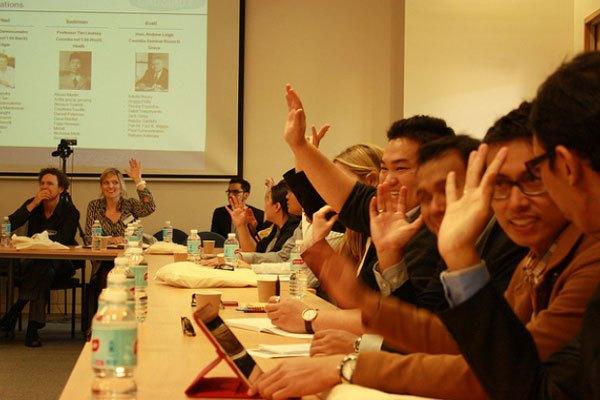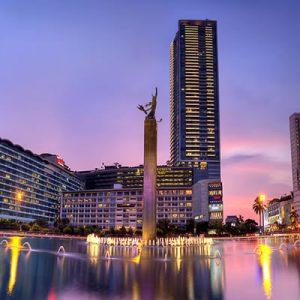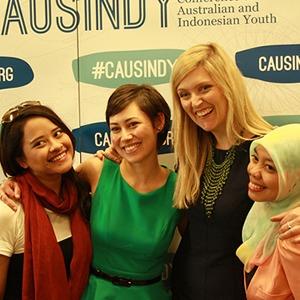ABOUT CAUSINDY
CAUSINDY, originally the Conference of Australian and Indonesian Youth, is a bilateral youth organisation which provides a platform for young leaders to create a stronger bilateral relationship. CAUSINDY is led by a volunteer team spread across both Australia and Indonesia.
Our flagship event is the annual Conference of Australian and Indonesian Youth, a four-day program which brings together 30 young leaders from Australia and Indonesia. Past delegates have included emerging leaders from a range of fields, from sitting members of parliament to leaders in business, academia and social enterprise.
CAUSINDY also coordinates an extensive network of alumni, produces a fortnightly bilingual podcast on events in the bilateral relationship, and provides resources for school and university teachers to highlight opportunities in both countries.
CAUSINDY was founded in 2012 by Bede Moore, Karina Akib and Chris Urbanski. and operated as an initiative of the Australia-Indonesia Youth Association (AIYA) from 2013 until the end of 2015. CAUSINDY and AIYA continue to work together as affiliates to build on their shared aspiration of a brighter future in Indonesia-Australia bilateral relations.


OUR OBJECTIVES
Create a platform for youth dialogue
Shape new ideas about the Australia-Indonesia relationship
Act as a catalyst for change
PREVIOUS CONFERENCES

TECH AND INNOVATION IN THE BILATERAL RELATIONSHIP
CAUSINDY 2017 — Melbourne
CAUSINDY 2017 focused on technology and innovation in the bilateral relationship and the future opportunities it presents for business to business collaboration.
Over the four day program of panels covering politics, business, defence & security and innovation & technology, renowned speakers and delegates explored new opportunities for collaboration and cooperation.
CAUSINDY’s Engaging Future Leaders program made an impact at the Australian grass-roots level, with delegates visiting several Australian high schools to share connect with students studying Bahasa Indonesia in addition to sharing their stories and passions for the bilateral relationship.

SUSTAINING THE RELATIONSHIP
CAUSINDY 2016 — Darwin
In 2016, CAUSINDY looked at ways to build a more sustainable and resilient bilateral relationship. Delegates discussed how the contemporary Australia-Indonesia relationship requires working beyond politics and traditional concepts and tapping into new areas of cooperation.
We also explored how the two countries can cultivate stronger links between our people, private sectors, creative industries, civil societies and media.

GOING BACK TO THE BEGINNING
CAUSINDY 2015 — Darwin
In 2015, CAUSINDY took a look at the origins of the relationship between Australia and Indonesia, and the history of contact between indigenous Australians and the Bugis people of Makassar.
Through a series of panel discussions, presentations and cultural activities, delegates learnt more about the early trading relationship between our two countries, and looked at future opportunities.
CAUSINDY 2015 also marked the first time that the conference took place across multiple locations, with live streaming events in Sydney, Melbourne, Jakarta and Kupang.

TRANSFORMING THE RELATIONSHIP
CAUSINDY 2014 — Jakarta
2014 brought CAUSINDY to Jakarta, where delegates focussed on new opportunities to grow the relationship away from aid and development towards business, trade and investment.
After opening with a heritage tour of Jakarta, delegates took dinner with the Australian Ambassador, and discussed the media’s influence on the relationship, and defence and security. Sessions on trade, the economy and the ‘behind the scenes’ political relationship culminated with an evening debate between business leaders John Denton and John Riady.

OUR TURN TO DECIDE
CAUSINDY 2013 — Canberra
At CAUSINDY 2013, young professionals and academics from Indonesia and Australia were provided the opportunity to connect with experts in business, government, and academia, and—most importantly—with one another.
The cohort discussed economic, social, cultural and political issues in the context of action on the bilateral relationship, and presented recommendations to enhance the relationship.

